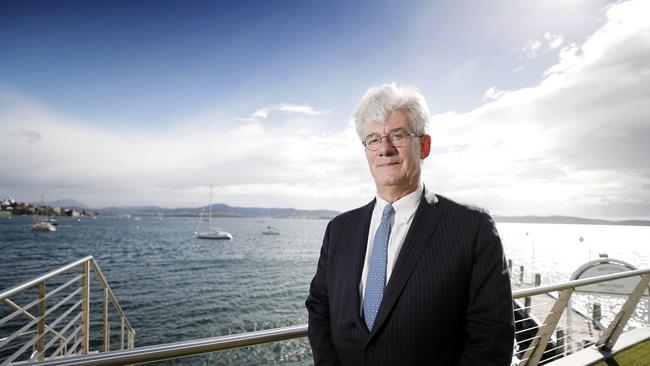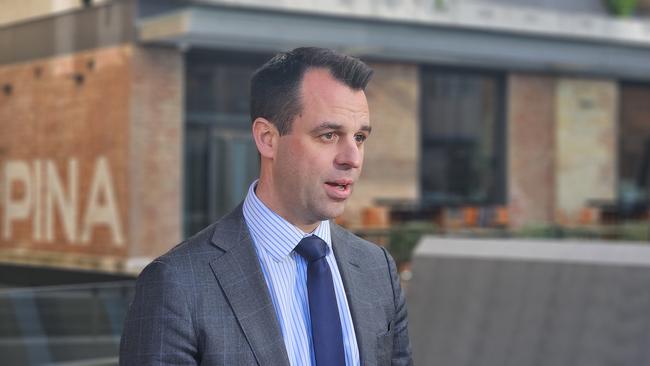Jacqui Lambie Network MPs back budget as economist Saul Eslake proposes six ways to fix Tasmania’s ‘unsustainable’ financial position
Despite a less-than-flattering review of the state’s finances by respected economist Saul Eslake, the Jacqui Lambie Network state MPs say they will support the state budget.

Tasmania
Don't miss out on the headlines from Tasmania. Followed categories will be added to My News.
Jacqui Lambie Network MPs say they will vote to pass next month’s state budget unamended despite a bleak review of the government’s fiscal management.
Respected economist Saul Eslake’s review of the state’s finances shows rising net debt and the resulting interest payments putting the state budget on the path of becoming unsustainable.
“Tasmania’s fiscal position has steadily deteriorated since about 2017-18.” Mr Eslake told reporters on Monday.
“Some of that’s attributable to Covid, and it’s understandable for that reason but the deterioration had begun before the pandemic set in and has continued after the pandemic had ended.
“My report shows, using publicly available information, that the deterioration in Tasmania’s financial position up to 2022-23 was entirely the result of policy decisions made by the government of the day.”
“It shouldn’t come as a surprise, because on at least three occasions since 2016, the Treasury, in its five-yearly financial fiscal stability reports has publicly warned of this possibility and with increasing urgency advised governments to take early corrective action.
“Action hasn’t been taken.”
The JLN’s federal leader Jacqui Lambie last week called for Treasurer Michael Ferguson to resign for his handling of the TT-Line saga.
Lambie Network MP Andrew Jenner said Mr Ferguson’s position was “becoming untenable”.
But the three party members said they would not back a no-confidence motion and Mr Ferguson’s position was a matter for the Premier.
JLN MP Miriam Beswick said the trio would back next month’s budget without amendment.
“We’re here to offer confidence and supply,’ she said.
“We were having a lot of offline conversations. We’ve obviously put in our budget bids,” she said.
“We have a really good working relationship with the Treasurer and the government, and we will continue to debate the budget, but we are here to offer confidence and supply.”

Labor’s Treasury spokesman Josh Willie said the Eslake report did not reflect well on Mr Ferguson.
“Treasurer Ferguson seems to have the reverse Midas touch,” he said.
“It doesn’t matter if it’s the health system, doesn’t matter if it’s trying to get the buses to run on time across the state or deliver infrastructure like the TT-Line ferry upgrades and associated docks.
“Now he’s delivered the biggest deficit in the state’s history, not by a little way, but four times as big as the deficit that was delivered in Covid.
“In a time of absolute crisis, he has wrecked the finances.”
Mr Ferguson described the Eslake report as an honest assessment.
“We can say today that while the state’s finances are sustainable, we always need to have discipline in the management of public finances. We need to have careful management,” he said.
He said he was disappointed by Ms Lambie’s call for his resignation.
“That was disappointing because we’re all working so effectively and properly,” he said.
“Together in Tasmania, the JLN members have been first-class politicians to work with. “They’ve been honest, they’ve provided stability in a circumstance where no major party had a majority of members in the House and they’re actually just good people.”
Eslake outlines six ways to help fix Tasmania’s ‘unsustainable’ economy
EARLIER: Tasmania’s financial position will become “unsustainable” and the worst in the country over the next three years, severely threatening the government’s capacity to provide services and infrastructure, a bleak review of the state’s finances says.
Economist Saul Eslake on Monday morning submitted his 130-page report into Tasmania’s finances to Premier Jeremy Rockliff and the three Jacqui Lambie Network MPs.
He makes 24 recommendations and said he was “astonished” that Treasury did not prepare 10-year projections of the state’s financial position other than as part of five year reviews – the last in 2021.
“Returning Tasmania’s public finances to a sustainable position – and no less importantly, keeping them there – represents a substantial and, the review readily acknowledges, politically challenging, task,” Mr Eslake wrote.
“It is one which is unlikely to be achieved during the life of the present parliament.”
He proposes the government and all political parties commit to achieving several fiscal targets over the next four to 10 years including “returning to an ‘underlying’ net operating surplus within four years”.

“But the review considers that ‘efficiency dividends’ and ‘vacancy control’ are very poor means of achieving meaningful and lasting expenditure savings.”
Mr Eslake recommends six measures for the government to consider to boost the coffers including:
BROADENING the base of payroll tax by lowering the existing tax-free threshold;
ABOLISHING stamp duty and replacing it with a broadly-based land tax;
IMPOSING a “modest surcharge on municipal rates on residential property similar to the existing fire and waste levies”.
EXTENDING the surcharges on stamp duty and land tax payable by foreign investors in residential real estate introduced in recent years to mainland-based investors in established residential real estate
INCREASING motor vehicle registration fees;
INCREASING duty on the purchase of expensive new motor vehicles; and
INCREASING mineral royalties in line with other states.
The review also recommends moving “the relatively small number” of public sector employees on the defined benefit superannuation schemes to defined contribution schemes.
“Drawing on publicly available information, the review finds that the deterioration in the financial position of Tasmania’s ‘general government sector’ – that is, state government departments and agencies funded primarily by taxation revenue or grants from the federal government – over the past decade is entirely attributable to ‘policy decisions’ by government (to increase ‘operating’ or recurrent expenses, and spending on infrastructure projects, and to a lesser extent to reduce taxes).
The deterioration in the state’s finances, the review says, will see net debt rising to more than$16bn (equivalent to more than 25 per cent of gross state product) by the end of the 2034-35 financial year, and interest payments rising from about $250m in 2024-25 to $730m in 2034-35.
“Such an outcome would almost certainly result in Tasmania’s credit rating being downgraded, probably by more than one ‘notch’, if it were allowed to happen.
“This should not come as a surprise.
“Since 2016, the Department of Treasury and Finance has repeatedly warned (in its Fiscal Sustainability Reports) of the risks to the sustainability of Tasmania’s fiscal position in the absence of corrective action (including reform of Tasmania’s taxation system), of the risks associated with taking such action later rather than sooner, and of the impossibility of relying on economic growth alone to maintain fiscal sustainability.
“Yet these warnings have gone unheeded, not just by the government of the day, but by all of the major participants in Tasmania’s political process, including during the campaign for the most recent state election.”
Mr Eslake said over the next three years Tasmania would be “running the largest public sector infrastructure program, relative to the size of its economy, of any state or territory – and questions whether Tasmania can afford to do this”.
Instead, he recommends the government determine how much it can afford to spend on infrastructure and rank projects in terms of their “social and economic benefits relative to their costs”.
“The fact that Tasmania has found itself in an unsustainable fiscal position for the third time in less than four decades (following the previous episodes in the early 1990s and early 2010s) suggests that Tasmania needs stronger institutions and more robust rules around the management of its public sector finances.”
Originally published as Jacqui Lambie Network MPs back budget as economist Saul Eslake proposes six ways to fix Tasmania’s ‘unsustainable’ financial position




